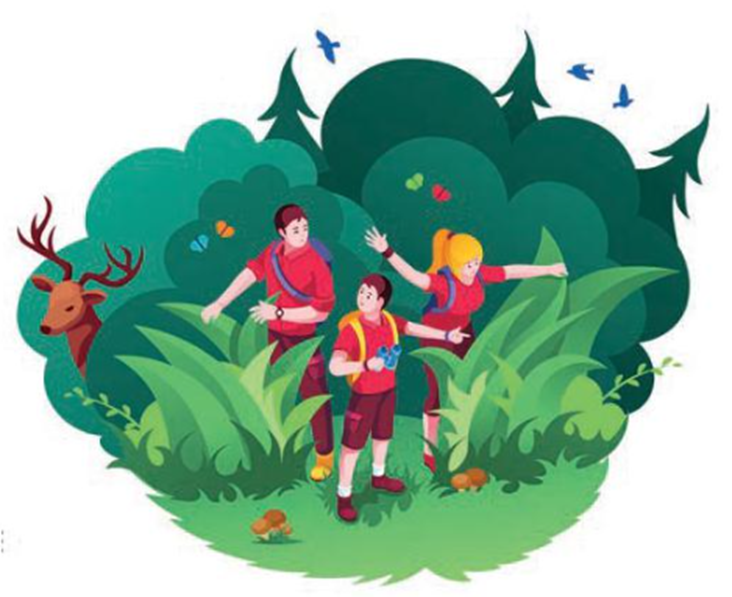Tiếng Anh 10 Unit 10 Looking backChoose the correct word to complete the conversation. Work in pairs. Role-play the conversation above. Try to use appropriate intonation. 1. Put the verbs in brackets in the correct forms. Quảng cáo
Lựa chọn câu để xem lời giải nhanh hơn
Vocabulary Video hướng dẫn giải Choose the correct word to complete the conversation. (Chọn từ đúng để hoàn thành đoạn hội thoại.) Mai: Ms Hoa, what is (1) mass / sustainable tourism? Ms Hoa: Well, the aim of this kind of tourism is to (2) protect / damage the environment, respect local culture, and keep (3) benefits / profits local. Mai: Can you give me an example? Ms Hoa: When travelling, we should not (4) litter / impact on the street. We should also be (5) aware / responsible of the local traditions and respect them. Mai: So is this kind of tourism similar to (6) ecotourism / mass tourism? Ms Hoa: Well, it's a form of sustainable tourism because it has a positive (7) impact / craft on the environment. Phương pháp giải: mass (adj): to lớn, đại chúng sustainable (adj): bền vững protect (v): bảo vệ damage (v): làm hư hại benefits: lợi ích profits: lợi nhuận litter (v): xả rác impact (v): tác động aware (adj): có nhận thức responsible (adj): có trách nhiệm ecotourism (n): du lịch sinh thái mass tourism: du lịch đại chúng craft (n): đồ thủ công Lời giải chi tiết:
Mai: Ms Hoa, what is (1) sustainable tourism? (Thưa cô Hoa, du lịch bền vững là gì) Ms Hoa: Well, the aim of this kind of tourism is to (2) protect the environment, respect local culture, and keep (3) profits local. (À, mục đích của loại hình du lịch này là bảo vệ môi trường, tôn trọng văn hóa địa phương và giữ lợi nhuận cho địa phương.) Mai: Can you give me an example? (Cô có thể cho con một ví dụ được không?) Ms Hoa: When travelling, we should not (4) litter on the street. We should also be (5) aware of the local traditions and respect them. (Khi đi du lịch, chúng ta không nên xả rác ra đường. Chúng ta cũng nên biết về các truyền thống địa phương và tôn trọng chúng.) Mai: So is this kind of tourism similar to (6) ecotourism? (Vậy loại hình du lịch này có giống với du lịch sinh thái không ạ?) Ms Hoa: Well, it's a form of sustainable tourism because it has a positive (7) impact on the environment. (À, đó là một hình thức du lịch bền vững vì nó có tác động tích cực đến môi trường.) Pronunciation Video hướng dẫn giải Work in pairs. Role-play the conversation above. Try to use appropriate intonation. (Làm việc theo cặp. Nhập vai vào đoạn hội thoại trên. Cố gắng sử dụng thành phần thích hợp.) Phương pháp giải: - Câu trần thuật thường có ngữ điệu xuống giọng ở cuối câu. - Câu hỏi có từ để hỏi Wh- thường có ngữ điệu xuống giọng ở cuối câu. - Câu hỏi không có từ để hỏi Yes-No thường có ngữ điệu lên giọng ở cuối câu. Grammar Video hướng dẫn giải Grammar Put the verbs in brackets in the correct forms. (Chia dạng đúng các động từ trong ngoặc.) 1. If I (be) ______ you, I (live) ______ with a host family so that I can learn more about the local culture. 2. If we (work) ______ together, we (be) ______ able to reduce the negative impact of tourism on the environment. 3. If we (allow) ______ more people to crowd the city centre, we (have) ______ to deal with environmental pollution in the future. 4. If we (have) ______ enough money, we (go) ______ on an ecotour to Finland. Instead, were staying in Viet Nam in the summer.
Phương pháp giải: - Câu điều kiện loại 1 nói về những tình huống có thật ở hiện tại hoặc tương lai, mà chúng ta tin rằng nó có thể hoặc có khả năng xảy ra. Cấu trúc: If + thì hiện tại đơn, … (will) … - Câu điều kiện loại 2 nói về những tình huống giả tưởng mà không có khả năng xảy ra. Cấu trúc: If + thì quá khứ đơn, … (would) … Lời giải chi tiết:
1. If I were you, I would live with a host family so that I can learn more about the local culture. (Nếu tôi là bạn, tôi sẽ sống với một gia đình bản xứ để có thể tìm hiểu thêm về văn hóa bản địa.) 2. If we work together, we will be able to reduce the negative impact of tourism on the environment. (Nếu chúng ta làm việc cùng nhau, chúng ta sẽ có thể giảm tác động tiêu cực của du lịch đến môi trường.) 3. If we allow more people to crowd the city centre, we will have to deal with environmental pollution in the future. (Nếu chúng ta cho phép nhiều người tập trung hơn vào trung tâm thành phố, chúng ta sẽ phải đối phó với ô nhiễm môi trường trong tương lai.) 4. If we had money, we would go on an ecotour to Finland. Instead, were staying in Viet Nam in the summer. (Nếu chúng tôi có tiền, chúng tôi sẽ đi du lịch sinh thái đến Phần Lan. Thay vào đó, họ ở Việt Nam vào mùa hè.) Từ vựng 1. 2. 3. 4.
|
||||||||||||





















Danh sách bình luận